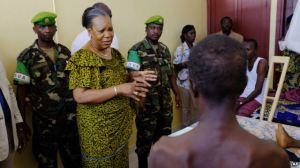By Kyle Herda
Impunity Watch Reporter, Europe
AMSTERDAM, Netherlands – Five convicted in the 1995 massacre at Srebrenica have had their sentences upheld by a judge at the UN Yugoslav tribunal in The Hague.

In just three days in Srebrenica, around 8,000 Bosnian men and boys were killed in what was the worst atrocity on European soil since World War Two. Towards the end of the conflict, around 20,000 refugees fled to Srebrenica to escape the Serbian forces, and UN Dutch forces subsequently protected the area. However, Bosnian Serb commander Ratko Mladic led his troops to take Srebrenica from the Dutch, and word of the massacre soon followed the occupation by Mladic. The European Parliament has since decided to recognize July 11 as a day of remembrance for the victims.
Not all of those responsible have received their sentences yet, as evidenced by former Bosnian political leader Radovan Karadzic remaining on trial and Mladic as well, both facing charges such as genocide. However, the five appeals finalized today kept the men in prison, and four of the five kept their sentences. Former Bosnian Serb army security chief Drago Nikolic and brigade commander Vinko Pandurevic retained 35 and 13 year sentences, while Vujadin Popovic and Ljubisa Beara had their life sentences affirmed. Only Radivoge Miletic received a lesser sentence, having his imprisonment reduced from 19 to 18 years.
Altogether, the UN Criminal Tribunal for the former Yugoslavia has charged 19 people. 315 witnesses have testified in trials for those charged, and some remains on trial. There have already been 141 proceedings, and another 15 are still ongoing for crimes stemming from the conflict, but the trials for those responsible for the Srebrenica massacre seems to stand out particularly.
For more information, please see:
The Daily Star – Verdicts upheld at UN tribunal – 31 January 2015
BBC – Srebrenica massacre verdicts upheld at war crimes tribunal – 30 January 2015
The New York Times – The Hague: Srebrenica Massacre Verdicts Are Upheld – 30 January 2015
Die Deutsche Welle – Srebrenica perpetrators lose appeals – 30 January 2015

